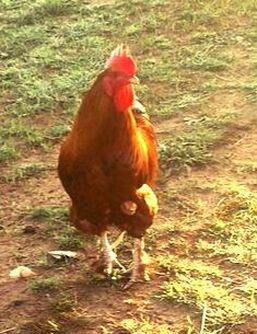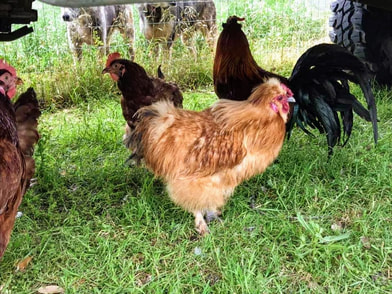How to introduce one or more roosters to your flock. If you only have hens and wish to introduce a rooster to your flock, you should have few problems if done correctly but if you are introducing a rooster to your flock that already has a rooster, you could have a real problem. It can be done, in some cases, depending on how many hens you have and the personality of your roosters. A basic rule of thumb is to make sure you have enough hens for each rooster, 6 to 12 hens per rooster is recommended.
 How to Introduce a New Rooster into your flock. CHOE
How to Introduce a New Rooster into your flock. CHOE
Introducing a new rooster to a flock with no other rooster
To introduce a new rooster to a flock where no other rooster is present you can simply isolate the new Rooster for 30 days just as you would any other bird and after the 30 day isolation. Place the Rooster in an open cage or pen where the girls can meet him for a few days. After two days you can release him into the flock, by the food and water dishes, while providing snacks, and he will quickly take ownership of the hens, flirting with them, finding them little tasty tidbits and rounding them up at sunset. He will be protective of them. He may end up in an initial conflict with your lead hen who may not wish to give up control of the flock. Watch carefully and break up any fights that may occur right away. Put the aggressive lead hen in a pet carrier or pen among the flock with food and water while allowing the rooster to meet the rest of the flock. Once he has the attention of the other hens and there is no conflict among them you may be able to release your lead hen. If she becomes aggressive again, pen her and wait until nightfall. Once the rooster all the other hens go to roost for the night you can bring your lead hen into the hen house and put her where she normally roosts. In the morning, she should make the adjustment without too much fuss. Scroll down to see how to introduce a new rooster to a flock that already has a rooster and some helpful tips you need to know before you introduce a rooster.
To introduce a new rooster to a flock where no other rooster is present you can simply isolate the new Rooster for 30 days just as you would any other bird and after the 30 day isolation. Place the Rooster in an open cage or pen where the girls can meet him for a few days. After two days you can release him into the flock, by the food and water dishes, while providing snacks, and he will quickly take ownership of the hens, flirting with them, finding them little tasty tidbits and rounding them up at sunset. He will be protective of them. He may end up in an initial conflict with your lead hen who may not wish to give up control of the flock. Watch carefully and break up any fights that may occur right away. Put the aggressive lead hen in a pet carrier or pen among the flock with food and water while allowing the rooster to meet the rest of the flock. Once he has the attention of the other hens and there is no conflict among them you may be able to release your lead hen. If she becomes aggressive again, pen her and wait until nightfall. Once the rooster all the other hens go to roost for the night you can bring your lead hen into the hen house and put her where she normally roosts. In the morning, she should make the adjustment without too much fuss. Scroll down to see how to introduce a new rooster to a flock that already has a rooster and some helpful tips you need to know before you introduce a rooster.

Introducing a new rooster to a flock that already has a rooster
During the quarantine period (30-90 days) keep the new rooster separated from the flock 30 days full isolation. Get some new fresh hens or raise some for your new rooster that your old rooster has never seen before.
During the quarantine period (30-90 days) keep the new rooster separated from the flock 30 days full isolation. Get some new fresh hens or raise some for your new rooster that your old rooster has never seen before.
- After the 30-60 day quarantine stage, put your new rooster with the new hens in a cage or pen inside the chicken coop for several days to a week so that they will smell like the other chickens in the flock and can be seen by the other birds with no access to them and your old flock will be more willing to accept them. Be sure to use wire small enough that if the roosters have a conflict at the cage or pen that they cannot actually harm each other. After the old rooster gets tired of messing with the new rooster (this could take a week or longer) it is time to make an attempt to introduce the new rooster.
- Before letting the new rooster and his hens into the flock be sure to put his water, food dish and roosts out where he can see them. When you take the new rooster and new hens out of the penned area, place them by their own feed dish. (It is best to do this in the afternoon or evening). If possible build a new roost for the new rooster and his hens. It is best to make an area and new roosting bar where the new rooster and his hen can roost at night. Provide the new rooster and his fresh hens with a new feed dish and waterer.
- If there is a conflict between the roosters, stop the fight right away. DO NOT LET THEM FIGHT. The first introduction is vitally important. If you allow them to fight they will consider this as something you allow. Break up the fight and put the new rooster and his hens back in the pen. Sternly verbally reprimand the old rooster and tell him the new rooster will be allowed and he is not to fight with him. Chickens are smarter than you think and if you talk to your chickens alot thy understand much more than you may realize.
- Make another attempt after all of the old chickens have gone to roost at night. Let the new rooster and the new hens out of their cage or pen at night and place them on their new roost. If you keep lights on in your coop at night make sure you use very dim ones or turn them off during a late night introduction.
- Get up before sunrise and give the flock a treat (the commotion will distract the old rooster) watch how they interact with one another. Let them out of the coop. Keep a close eye on the roosters. If a conflict does develop do not allow them to fight! Step in between them and grab the older rooster and firmly tell him "NO" then place him outdoors, which will allow the new rooster to adjust to the hen house or chicken coop without a battle.
- Watch the roosters closely.
- Always bring a new rooster in with his own hens, own feed dish, and own waterer at the very least. When the older rooster sees that the new rooster is bringing in young fresh hens and is not competing for food or water there tends to be much less conflict between them and the roosters will establish their own areas with the new rooster generally staying with his own hens away from the old rooster.
Things You Need to Know Before You Introduce A Rooster to Your Flock
Before you get a rooster and before you introduce a new rooster to your flock there are some important things you need to know.
- Learn everything you can about roosters before you get one. (See button below).
- Check with your city or county ordinances via the county clerk or the city or county website to make sure roosters are allowed where you live.
- Your existing flock may not accept your new rooster or hen because they smell different. You can overcome this in several ways by bathing all your birds, allowing the new bird an area inside your pen to dust bathe, keep the new bird inside the hen house at night, or use a parasite spray and spray each bird in your flock and the new one. The object is to get the new bird to smell like the existing birds.
- You can put the new rooster in the coop at night and your hens can meet him in the morning under your supervision of course.
- Provide treats during the introduction.
- Roosters are extremely territorial. If you already have a rooster who is well established in your flock it is not a good idea to add another rooster.
- Don't put a standard or large size breed rooster with smaller breeds such as silkies or bantams due to the fact that a large rooster can injure or even kill a smaller breed chicken.
- Chickens should be kept in separate flocks by breed, size, and age.
- If you lost any chickens to predators or sickness it is not a good idea to get new chickens. If your chickens were sick your new birds may also get sick. Protect your chickens from most sickness and disease by getting them vaccinated and keeping the coop, feed and water clean. If a predator got your chickens you should move and secure your coop or get a more secure one and use predator protectors.


